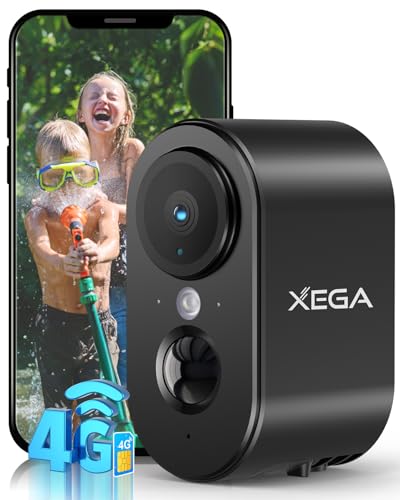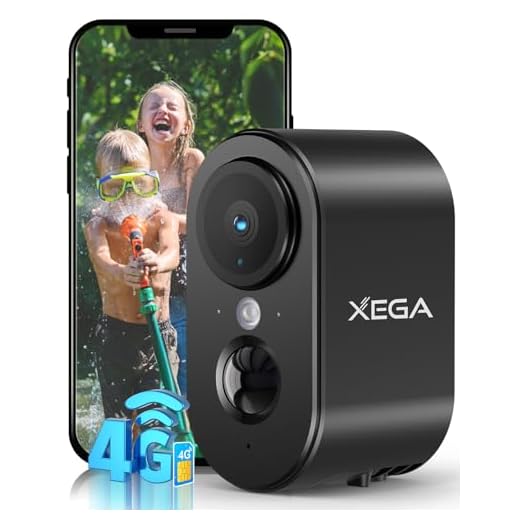


In today’s connected world, wifi-enabled security cameras have become a popular choice for home and business surveillance. However, there are situations where a wifi connection may not be available or desirable. In such cases, you may be wondering if there is a security camera that does not need wifi.
The good news is that there are security cameras available that do not require a wifi connection to function. These cameras use alternative methods of communication, such as cellular networks or local storage, to transmit and store video footage. This can be particularly useful in remote locations or areas where wifi signals are weak or unreliable.
By opting for a security camera that does not rely on wifi, you can ensure a reliable and secure surveillance system that meets your specific needs. Whether you’re looking to monitor a property off the grid or simply prefer a non-wifi solution, there are options available to suit your requirements.
Security Cameras Without WiFi: Are They Available?
When it comes to security cameras, many people rely on WiFi connectivity for remote monitoring and data transmission. However, there are situations where WiFi may not be available or desired, leading to the question: are security cameras without WiFi available?
The answer is yes! There are security cameras that do not require WiFi to function. These cameras typically use other means of communication, such as Ethernet cables or local storage options, to provide surveillance capabilities without the need for a WiFi connection.
Benefits of Security Cameras Without WiFi
Security cameras without WiFi have several advantages:
- Increased Security: Since these cameras do not rely on a WiFi connection, they are less vulnerable to hacking or interference.
- Reliable Performance: Without the need for WiFi, these cameras can provide constant surveillance without interruptions due to network issues.
Types of Security Cameras Without WiFi
There are different types of security cameras that do not require WiFi, including:
- Wired Cameras: These cameras connect directly to a recording device or monitor using cables, such as Ethernet cables, for data transmission.
- Wire-Free Cameras: These cameras operate independently using local storage options, such as SD cards, for recording footage without the need for a WiFi connection.
Overall, security cameras without WiFi offer a reliable and secure option for surveillance in situations where WiFi connectivity is not available or preferred.
Pros and Cons of WiFi-Free Security Cameras
Pros:
- Independence: WiFi-free security cameras do not rely on an internet connection, providing a more stable and secure surveillance system.
- Privacy: With no WiFi connection, there is less risk of hacking or unauthorized access to the camera feed.
- Easy Installation: These cameras are typically easier to set up as they do not require network configuration.
- Cost-Effective: WiFi-free cameras may be more affordable as they do not require additional hardware for wireless connectivity.
Cons:
- Limited Remote Access: Without WiFi, remote access to camera feeds may be restricted to local viewing only.
- No Cloud Storage: WiFi-free cameras may lack cloud storage options for saving and accessing recordings remotely.
- No Smart Home Integration: These cameras may not be compatible with smart home devices or automation systems that require a WiFi connection.
Wired vs. Wireless Security Camera Systems
When choosing a security camera system, one of the key decisions you’ll need to make is whether to go with a wired or wireless setup. Wired systems require cables to connect the cameras to the recording device, while wireless systems use Wi-Fi networks to transmit video footage.
Wired systems are typically more reliable and less prone to interference, making them a good choice for areas with a lot of signal congestion or where a stable connection is essential. They also don’t rely on Wi-Fi, so they can still function even if your internet goes down.
On the other hand, wireless systems offer more flexibility in terms of installation, as you don’t have to worry about running cables through walls or ceilings. They are easier to set up and can be moved around more easily if needed. However, they may be subject to signal interference or hacking if not properly secured.
Ultimately, the decision between wired and wireless security camera systems will depend on your specific needs and preferences. Consider factors like reliability, ease of installation, and security when making your choice.
Alternative Connectivity Options for Security Cameras
While many security cameras rely on Wi-Fi for connectivity, there are alternative options available for those who prefer not to use Wi-Fi:
1. PoE (Power over Ethernet): Security cameras that support PoE can be powered and connected to the internet using a single Ethernet cable. This eliminates the need for a separate power source and Wi-Fi connection.
2. Cellular: Some security cameras come with built-in cellular connectivity, allowing them to transmit data over a cellular network instead of Wi-Fi. This can be a good option for remote locations or areas with unreliable Wi-Fi coverage.
3. SD Card Storage: Cameras with built-in SD card slots can store footage locally on the card, eliminating the need for constant internet connectivity. Users can access the stored footage by removing the SD card from the camera.
4. Wired Connections: Some security cameras can be connected directly to a DVR or NVR using a wired connection, bypassing the need for Wi-Fi altogether. This setup can provide a more secure and reliable connection compared to wireless options.
By considering these alternative connectivity options, users can choose a security camera that best fits their needs and preferences, even if they prefer not to use Wi-Fi.
Features to Look for in WiFi-Less Security Cameras
When choosing a security camera that does not require WiFi, there are several key features to consider to ensure you get the best surveillance system for your needs.
| Local Storage: | Look for cameras with built-in storage options such as SD cards or internal memory to store recorded footage locally. |
| Battery-Powered: | Opt for cameras that are battery-powered for flexible installation and continuous monitoring without the need for a power outlet. |
| Weatherproof Design: | Ensure the camera is designed to withstand outdoor conditions with a weatherproof rating to protect it from rain, snow, and extreme temperatures. |
| Night Vision: | Choose a camera with infrared LEDs for clear night vision capabilities, allowing you to monitor your property even in low-light or dark conditions. |
| Motion Detection: | Look for cameras with motion detection technology to trigger recordings and alerts when movement is detected, enhancing security monitoring. |
Best Non-WiFi Security Cameras on the Market
When it comes to security cameras that don’t require WiFi, there are some excellent options available on the market. These cameras offer reliable security monitoring without the need for a WiFi connection, making them ideal for areas with limited internet access or concerns about WiFi security. Here are some of the best non-WiFi security cameras you can consider:
1. Reolink Argus 2: This battery-powered security camera offers excellent video quality and motion detection capabilities. It can be easily installed indoors or outdoors without the need for a WiFi connection.
2. Arlo Go: Arlo Go is a cellular security camera that operates on a 3G/4G LTE network, making it ideal for remote locations where WiFi is not available. It offers advanced features like night vision and two-way audio.
3. Blink XT2: The Blink XT2 is a weatherproof security camera that runs on two AA lithium batteries and can last for up to two years. It offers motion detection, cloud storage, and easy installation without the need for WiFi.
4. Zmodo Wireless Security Camera System: This non-WiFi security camera system includes four cameras and a central hub that connects them wirelessly. It offers 24/7 recording, remote access, and motion detection features.
These are just a few of the top non-WiFi security cameras available on the market. Whether you need a standalone camera or a complete security system, there are plenty of options to choose from to meet your security needs.
How to Install and Set Up a WiFi-Free Security Camera
If you are looking to install a security camera that does not require WiFi, follow these steps to set it up:
- Choose a suitable location for the camera where it has a clear view of the area you want to monitor.
- Mount the camera securely using the provided mounting hardware.
- Connect the camera to a power source using the included power adapter.
- Adjust the camera angle and settings to ensure optimal coverage.
- Insert a memory card into the camera if it supports local storage for video recording.
- Follow the manufacturer’s instructions to set up any additional features or settings.
- Test the camera to ensure it is functioning correctly and capturing the desired footage.
Benefits of WiFi-Free Security Cameras:
- Do not rely on an internet connection, making them more secure against hacking.
- Work in areas with poor or no WiFi signal.
- Provide a reliable surveillance solution without the need for WiFi infrastructure.
Tips for Maximizing the Security of Non-WiFi Cameras
While non-WiFi cameras offer certain advantages in terms of security, there are still steps you can take to maximize their effectiveness. Here are some tips:
1. Physical Security: Ensure that the camera is mounted securely and out of reach to prevent tampering or theft.
2. Regular Maintenance: Check the camera regularly to ensure it is functioning properly and has not been damaged.
3. Storage Security: If the camera records footage, store the recordings in a secure location to prevent unauthorized access.
4. Power Source: Use a reliable power source to ensure the camera remains operational at all times.
5. Restricted Access: Limit access to the camera to authorized individuals only to prevent misuse or interference.
6. Backup Plan: Have a backup plan in place in case the camera fails or is compromised.
By following these tips, you can enhance the security of non-WiFi cameras and ensure they are effective in monitoring your property.
Common Misconceptions About WiFi-Free Security Cameras
There are some common misconceptions about security cameras that do not require WiFi. Let’s debunk a few of them:
| Myth: WiFi-free security cameras are not as reliable as WiFi-enabled ones. | Reality: WiFi-free cameras can be just as reliable, especially in areas with poor WiFi signal or during internet outages. |
| Myth: WiFi-free cameras cannot be accessed remotely. | Reality: Many WiFi-free cameras offer options for local storage or SD card recording, allowing users to access footage without WiFi. |
| Myth: WiFi-free cameras are harder to set up and use. | Reality: Setting up a WiFi-free camera may require running cables, but it can be straightforward and user-friendly once installed. |
| Myth: WiFi-free cameras are outdated technology. | Reality: WiFi-free cameras are still popular for their reliability, security, and lack of dependency on internet connectivity. |
By understanding these misconceptions, you can make an informed decision about whether a WiFi-free security camera is the right choice for your needs.
Future Trends in WiFi-Less Surveillance Technology
As technology continues to advance, the field of surveillance is also evolving. One of the emerging trends is the development of security cameras that do not require a WiFi connection to function. These cameras offer a range of benefits, including increased security and privacy, as well as improved reliability.
The Rise of Cellular Surveillance Cameras
One key trend in WiFi-less surveillance technology is the rise of cellular surveillance cameras. These cameras use cellular networks to transmit data, eliminating the need for a WiFi connection. This technology allows for remote monitoring in areas where WiFi signals may be weak or non-existent, making it ideal for outdoor surveillance or remote locations.
Advancements in Battery-Powered Cameras
Another trend in WiFi-less surveillance technology is the development of battery-powered cameras. These cameras are equipped with long-lasting batteries, allowing them to operate without the need for a constant power source. This makes them ideal for temporary surveillance or locations where power outlets are scarce.






